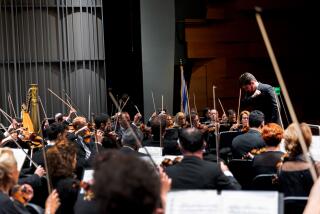A 1930s legacy, all but lost, is fortuitously recovered
- Share via
“Wolpe in Jerusalem”
WDR Symphony Orchestra. Johannes Kalitzke and Werner Herbers, conductors. (Mode)
***
WHEN Stefan Wolpe came to New York after fleeing Nazi Germany, he was known as a stubborn composer of brilliantly Modernist music. He was also known as something of a reluctant father of American avant-gardists -- he was mentor to both pianist David Tudor and composer Morton Feldman. But little is known of the four years he spent in Jerusalem after leaving Berlin and before arriving in America. The Israelis all but erased him from their history, finding him too ornery for a then conservative musical culture -- a headache is better than his music, one Israeli critic wrote.
They can have their headaches. It turns out Wolpe wrote some remarkable music while in Jerusalem that is only now being rediscovered; much of this disc contains first recordings. The Passacaglia for orchestra is a gripping 12-tone score from 1937 that manages to sound angry and visionary at the same time. To dislike Wolpe’s witty, rambunctious and engagingly melodic incidental music for Moliere’s “The Imaginary Invalid” seems all but impossible. The “Hexachord Suite” for oboe and clarinet is intriguingly inspired by Arab music. The Concerto for Nine Instruments is a curiosity, since the violin part was lost and reconstructed in 2000, but the vigor of the musical imagination is still unmistakable. The performances are compelling.
Mark Swed
More to Read
The biggest entertainment stories
Get our big stories about Hollywood, film, television, music, arts, culture and more right in your inbox as soon as they publish.
You may occasionally receive promotional content from the Los Angeles Times.











